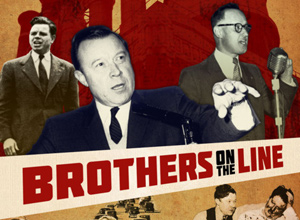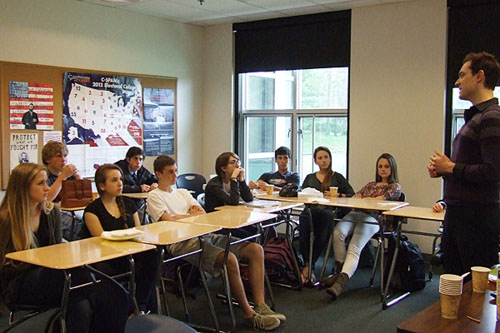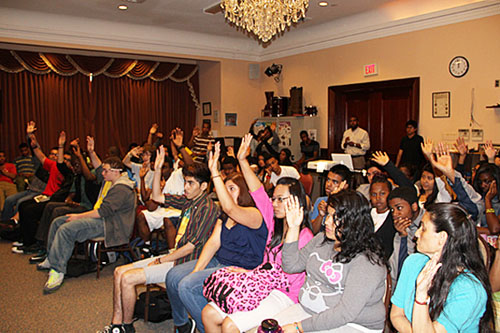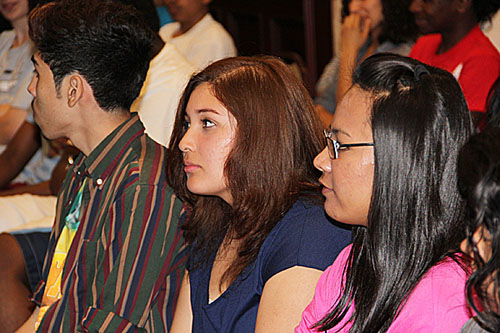Sasha Reuther Shares Labor Film with Students: Filmfest 2012
By Jozi Zwerdling
Students in Washington, D.C., had the rare opportunity to discuss the hidden history of labor through Brothers on the Line, a new film they screened in school, with Sasha Reuther, who is both the filmmaker and grandson of one of the famous Reuther brothers.
Teaching for Change and Filmfest DC, with the support of the Wyncote Foundation, worked with educators Julian Hipkins III at Capital City Public Charter School and Susan Ikenberry at Georgetown Day School to bring Reuther to the two schools in mid-April for question and answer sessions with the students.
Reuther later told Teaching for Change, “Your organization is doing such important work. I was honored to play a small part in that. The school visits were enlightening and inspiring. We had a robust discussion of history and film technique in both settings, each with their own unique observations. . . . My primary wish for the film is that it would have a long shelf life as a strong educational resource and I feel that we are now on our way.”
During the meetings with Reuther, students asked critical questions about the work that went into creating the historical documentary, the people and politics in the film, and Reuther’s personal challenges and triumphs during production. “Some of their questions caused me to view the film in a new light and with a fresh pair of eyes. The students appeared to be most excited about seeing landmark moments in U.S. history (the March on Washington, Kennedy presidency/assassination, the Vietnam War, etc.) from another perspective . . . through working-class eyes, so to speak,” Reuther reflected later.
In response to a student wondering what sparked his decision to make Brothers on the Line, Reuther explained, “I had immediate access to this fascinating piece of U.S. history. If I hadn’t grown up in this family, I don’t think I would have learned about labor history in high school. Textbooks only touched on it.”
Students also asked if Reuther believed the labor movement aspects of the Civil Rights Movement should be emphasized more in history, how corporations responded to the truth being told about their practices, if it was a conflict of interest as a filmmaker to be a member of the Reuther family, and if any funders tried to influence the film. Reuther assured the students that his family only encouraged his honest and balanced approach in depicting the Reuther trio that led the labor movement of the time, and that he was able to maintain full directorial control throughout the process, though he had to deflect an attempt from a funder to read the script before he finished the film.
One student commented that the teachers’ unions in Wisconsin must be enthusiastic about the film. Reuther agreed, saying, “The economy is in the dumps, it’s really a timely story. Having an organization that fights for everyday people is important. . . . It was a great boon for the industry that labor was there. They protected everyone and lifted all the boats, because people getting paid more means they will buy more.”
Another student asked Reuther what history topics he plans to document next. Reuther referred to his research for this documentary, explaining, “It’s calledBrothers on the Line, but honestly there were a lot of the sisters on the line. I was excited to learn at the end not just about the men inside the plant but also about the wives and mothers and sisters who were there. They were organizers on the picket line. Many spoke multiple languages and translated for people, so it was a family and community movement. They weren’t just cooking. The women’s story is a very dynamic story. If PBS or HBO buys this documentary and wants a part two, I would be very excited for it.”
Tony Gittens, the festival director for Filmfest DC, later thanked Teaching for Change for the “invaluable outreach and guidance.” He explained, “At Filmfest DC we celebrate the power of cinema to educate and inform, and the importance of the opportunity to make a personal connection with the creative people who are responsible. Sasha’s face–to-face interactions with the students provided a living link to bring history and the struggles of working people alive for them and also demonstrated how media is made by real people making choices about what they will show us.”




